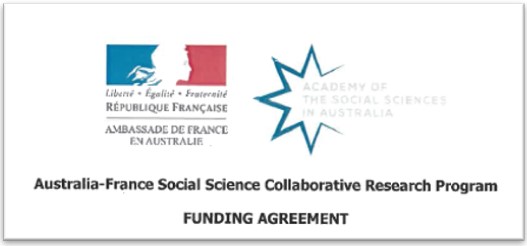 2020 grant winners announced
2020 grant winners announced
The Embassy of France and the Academy of the Social Sciences in Australia have announced funding of $24,898 to support five projects tackling major societal issues facing Australia and France. The five grant recipients were selected from more than 50 applications through a competitive selection process, demonstrating the excellence and dynamism of French-Australian research collaborations.
The five successful projects are:
- Environmental Changes and Heritage in the Fijian Islands (Research Center on Archaeology, Archaeoscience and History; the University of the Sunshine Coast; and the Fiji Museum. Project Leader: Professor Rita Compatangelo-Soussignan):
This project aims to carry out a multi-disciplinary study of the “prehistoric” (prior to European colonization) hillforts of the Fiji Islands, taking into account the interaction between socio-economic factors and changing climatic and environmental conditions. The pattern of the shifts in settlements found in inland upland locations will be studied in relation to climate and environmental conditions, with aerial photographs, LiDAR remote sensing coverage, as well as the collection of ancient oral stories from local communities.
- Maohi Voyagers to France and Australia, 1760s-1860s (Department of Modern History of the French Polynesia University; and Department of Modern History, Politics and International Relations of Macquarie University. Project Leader: Associate Professor Kate Fullagar):
This project will study Maohi (Tahitian Islander) voyagers of the late 1700s with the goal of unravelling the Indigenous perspective. The study aims at collating and analysing for the first time a record of all Maohi migrations, to better understand the links they created between different parts of the world, including between France and Australia, and to assess the imperial-Indigenous connections. A series of activities (public lectures, workshop for scholars into Islander-imperial history, 1760-1860, dedicated masterclass for graduate students and research at the Taputapuatea Marae Islands and the Tahiti Museums) should lead to the development of a more structured collaboration.
- Indigenous knowledge and totemic representations of flying foxes in the Cape York Peninsula (CNRS/Collège de France; and Melbourne School of Population and Global Health at the University of Melbourne. Project Leader: Dr Arnaud Morvan):
Flying foxes and bats are crucial for the ecosystem (pollinisation, cross-pollinisation, seed dispersal, insect regulation), but are also major virus reservoirs (Ebola, Hendra, Lyssavirus). This project will document and analyse the ecological, medicinal and cultural knowledge of local bats by indigenous Australians from the Aurukun region. Their environmental practices (medicinal uses of bats, roles as totems in cultural practices…) will help to unravel the distribution of substances and pathogens between animal species, including humans, and to inform bat conservation policies, and the management of global zoonotic risks.
- Past and future impact of aquaculture on indigenous communities in New Caledonia (Université de Bretagne Occidentale; and the University of Technology Sydney. Project Leader: Dr Marianna Cavallo):
New Caledonia is experiencing conflicts between traditional fishing and the development of aquaculture. This project aims to identify and analyze the actors and the development of this sector, and particularly the participation of the indigenous communities, the Kanak, in order to assess its impact on cultural values and social organization. In the light of the information gathered from the scientific literature, national and regional reports, surveys and interviews, some recommendations will be proposed to improve social equity and inclusion in coastal fishery and aquaculture management.
- Bagnards and Convicts: Preserving Penal Heritage in New Caledonia and Australia (Project Leader: Dr Briony Neilson of the University of Sydney in consultation with various historians in New Caledonia and France):
The objectives of this project are to investigate the strategies of preserving convict history in New Caledonia; to track the significance of the convict past for New Caledonian society; and to examine how convict heritage shapes New Caledonia’s relations with the French metropole and with Australia, especially in the context of New Caledonia’s campaigns for decolonisation. The research will consist of collecting and analysing information from museums and historic sites, conducting interviews with heritage groups, scholarly societies and museum representatives, to understand the impact of New Caledonia’s convict history.
These initiatives build transdisciplinary practices between different science communities on areas of strategic importance for France and Australia such as climate change adaptation, resources management, biosecurity and biodiversity preservation, or international relations. The areas covered by the submitted project proposals illustrate the breadth and depth of the social sciences linkages in every fields of science and the involvement of researchers from a wide range of institutions in both countries.
The Academy and the Embassy congratulate all of the successful recipients of the program.